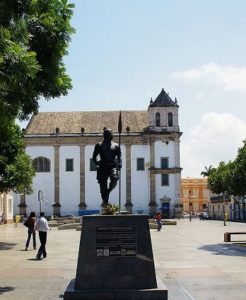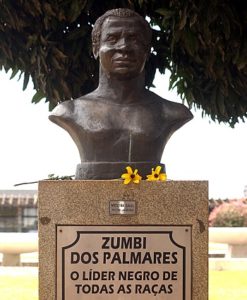
Monuments of Zumbi dos Palmares in front of Basílica Cathedral, Salvador-Bahia in Brasilia. Photo: Albenisio Fonseca
In Brazil, November 20th is a day set aside to commemorate what is known as National Black Consciousness Day or dia da consciência negra, in Portuguese language.
Over one thousand cities across the country declare the day a public holiday. In Salvador of Bahia state, the first colonial capital of Brazil, which has the largest population of Black people, the entire month is celebrated as Black November and Bahians participate in freedom walks, conferences and other cultural activities.
The date owes its historical significance to the murder of Zumbi dos Palmares, a descendant of Imbangala warriors from Angola and leader of one of the quilombos; Brazilian fugitive settlements that were formed by enslaved Africans or Maroons, who escaped from the hands of brutal slave masters.
Zumbi was born a freeman in 1655 in Serra da Barriga, Palmares, a quilombo that is today located in the state of Alagoas of Brazil. At the age of 6, he was captured by Portuguese and given to missionary Father António Melo as a slave in 1661. In 1670, he escaped and returned to Palmares where he soon launched an antislavery campaign and resistance against Portuguese oppression.
Along with other members of quilombos, Zumbi helped accommodate many runaway slaves, marginalized minorities, Arabs, indigenous people and Jews who were subjected to oppression at the time.
In 1694, Domingos Jorge Velho, a Portuguese bandeirante, acting on orders of João da Cunha Souto Maior, the governor of Pernambuco, exterminated several quilombos including Palmares.
Betrayed by one of his own, Zumbi was captured and beheaded by the Portuguese on Nov. 20, 1695. His head was transported to Recife, where it was displayed in public as a warning to rebelling slaves.
After the murder of Zumbi, several revolts by slaves in Brazil were recorded, notably in 1807, 1809, 1813, 1816 and 1827. However, the most significant uprising was to take place was in 1835, in what has come to be known as revolta dos malês, the revolt of Malams.
Led by a group of Hausa and Yoruba men, mostly Muslims brought to Brazil from Nigeria, Niger, Mozambique, Sudan and other African countries, Black men staged a rebellion in Salvador.
Malam Victorio Sule and Malam Manoel Calafate mobilized other members of ethnic groups from Africa to rise up in rebellion. Their plan was to free all the slaves in Bahia and establish what they conceived as a caliphate in Salvador.
Although the revolt was organized by Hausas, all of the African ethnic and religious groups were represented in the participants. This rebel movement was also betrayed following its denunciation by Domingos Fortunato and his wife, Guilhermina Roza de Souza. By dawn’s early light on Sunday Jan. 25 1835, the Malams were crushed by the imperial police and all but decimated in Água de Meninos, Salvador.
Lost in the Brazilian sociocultural milieu, the influence of Malams can still be seen in Salvador, especially in clothing, with the use of turbans, long skirts and shawls and Muslim mantras. The influence of Islam, Yoruba religion with some aspects of Christianity may be seen in distinct Afro-Brazilian religious groups like Candomble and Umbanda.
Throughout the country, there is unmistakable Yoruba presence in culinary, religious matters. The deep spiritual connection is apparent in the African ancestral deities of Oxala and Orixas, which correspond to points of force of nature.
But Oxala (pronounced oshala), a Portuguese word that means God willing, may have originated from the Arabic phrase, Insha’Allah. As it were, the only successful slave revolt recognized in classical antiquity of Americas was the struggle for independence of Haiti (colonized by the French), which was itself inspired by the ideals of the French Revolution.
Today, Maceió, the capital of Alagoas, houses Zumbi dos Palmares International Airport, named after the warrior in 1999. However, it was only in 2003 that the story of Zumbi was brought to full national consciousness when President Luiz Inacio Lula da Silva established the National Black Consciousness Day under a law numbered 10,639, which promotes, among other things, the inclusion of the history of Afro-Brazilians in schools, hitherto nonexistent in the country’s educational curriculum.
Although Black awareness day used to be celebrated on May 13, the day on which slavery was abolished, the change to Nov. 20 seems to appeal more to Afro-Brazilians given its deep significance. By February 2011, President Dilma Rouseff signed the decree into law.
The historical significance of the struggle of Zumbi remains an important spiritual inspiration and a rallying point for what is today regarded as Afro-Brazilian identity in Brazil. The story resonates with that of Solomon Northup, another free Black man who was kidnapped in Washington, D.C. in 1841 and sold into slavery only to be released after 12 years of slave work on plantations in the state of Louisiana.
Abdulrazak B Ibrahim



